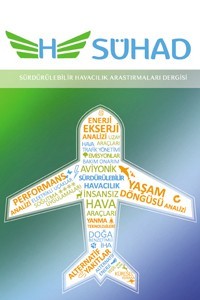Havacılıkta Alternatif Yakıt Kullanılmasının İncelenmesi
Dünya ekonomisi büyüdükçe ticaret yapan ülkeler için ürünlerin hızlı ulaştırılması isteği, başta var olan enerji kaynaklarının etkili kullanılmasını ve sonrasında ucuz ve temiz enerji kaynaklarının elde edilmesini önemli hale getirmiştir. Özellikle havayolu ile yolcu taşımacılığı başta olmak üzere kargo transferlerinin büyük çoğunluğunun yapıldığı havacılık sektöründe ulaşım maliyetini belirleyen en önemli etkenlerden bir tanesi de bu taşıtlarda kullanılan yakıtlardır. Günümüzde petrol türevli yakıt kullanan hava taşıtları atmosferdeki kirletici emisyonların artışına da olumsuz etki yapmaktadır. Karayolu taşıtlarında bu olumsuzlukların ortadan kaldırılması maksadıyla uzun yıllardan beri alternatif yakıt kullanımına yönelik çalışmalar yapılmakta ve ülkeler hem çevreyi korumak hem de petrole olan bağımlılıklarını azaltmak için biyoyakıt kullanılmasını teşvik etmektedir. Benzer şekilde havacılık sektöründe de bu potansiyelin belirlenmesi ve alternatif yakıtların kullanılabilirliğinin incelenmesi ihtiyacını doğurmuştur. Bu maksatla yapılan çalışmada, havacılık sektöründe biyoyakıt kullanımının gerekliliği ve kullanılabilecek alternatif yakıt türlerinin özellikleri incelenmiştir. Sonuç olarak, gelecekte üretilecek hava taşıtlarının yakıt sistemleri ve özgün tasarımları sayesinde, içten yanmalı motorlar ve gaz türbinlerinde kullanılabilecek alternatif yakıtların benzer özelliklerde olabileceği bunun karayolu ve havayolu taşımacılığında yakıt birliği yaratarak ekonomik gelişmeye ve çevrenin korunmasına katkı sağlayacağı değerlendirilmiştir
Anahtar Kelimeler:
Hava taşıtları, biyoyakıtlar, yakıt özellikleri, emisyon
EXAMINATION OF THE USE OF ALTERNATIVE FUELS IN AVIATION
As the world economy grows, it has become important for countries to transport products quickly, to use energy efficiently, and to obtain cheap and clean energy resources. One of the factors determining the cost of transportation in the aviation sector, the vast majority of which includes cargo transfers and passenger transport by airlines, is the fuels used in air vehicles. At present, air vehicles using petroleum-derived fuels have a negative effect on the levels of pollutants in the atmosphere. With the purpose of eliminating those negative effects on ground (road) vehicles, research on alternative fuels has been done for many years, and in many countries, in order to protect the environment and to decrease the dependency on oil, through promoting the use of biofuels. Similarly, it is necessary to examine the use of alternative fuels and to explore their potential usability within the aviation sector. With this purpose in mind, this study outlines the necessity of using biofuels in the aviation sector and the characteristics of alternative aviation fuels. It is concluded that there is potential for alternative fuels, which would have similar properties to those currently being investigated in internal combustion engines and gas turbines, and their creation would call for the possibility of new fuel systems and unique designs for aircrafts in coming years. Use of such common fuels may create a consensus in both ground and air transportations, which would contributing positively to both economic development and environmental protection
Keywords:
Air vehicles, biofuels, fuel properties, emission,
___
- Daggett D., Hadaller, O., Hendricks,R., Walther,R., “Alternative fuels and their potential impact on aviation”, NASA/TM-2006-214365.
- Daggett D., Hendricks,R., Walther,R., Corporan E., “Alternate Fuels for use in Commercial Aircraft”, Boeing, 2007.
- Demirbaş A., Green energy and technology biofuels, London: Springer Verlag, 1-4, (2009).
- Demirbaş, A., Biodiesel, A realistic fuel alternative for diesel engines, London: Springer-Verlag, 65-92, (2008).
- Drapcho, C. M., Nhuan, N., P. and Walker, T., H., Biofuels engineering process technology, New York: Mc Graw Hill, 69-94, (2008).
- Dudley B., “Statistical rewiev world of energy, BP”, 6- 19, (2012).
- EIA, “Annual energy outlook 2012 with projections to 2035”, 17-63, (2012).
- EPDK, “Enerji yatırımcısı el kiabı”, 45-52, (2012).
- EPDK, “Petrol piyasası sekör raporu”, 1-11, (2012). World Energy Council, “Enerji raporu”, 43-50, (2011).
- Hileman J.I., Wong H.M., Ortiz D., Brown N., Maurice L., Rumizen environmental commercial aviation” 26th International congress of the aeronautical sciences, ICAS 2008. and potential alternative fuels for
- IATA Guidance Material for Sustainable Aviation Fuel Management, 2 th edition 2015, Montreal, Geneva.
- IATA Sustainable Aviation Fuel Roadmap, 2 th edition 2015, Montreal, Geneva.
- IEA, “Key world energy statıstıcs”, 6-11, (2012).
- IEA, “CO2 emission from fuel combustion”, 37-39, (2012).
- Lin, L., Cunshan, Z., Vittayapadung, S., Xiangqian, S. and Mingdong, D., “Opportunities and challenges for biodiesel fuel”, Applied Energy, 88, 1020-1031, (2011). IATA 2015 Report on Alternative Fuels, 10 th edition December 2015, Montreal, Geneva.
- Nigam, P. S. and Singh, A., “Production of liquid biofuels Progress in Energy and Combustion Science, 37, 52-68, (2011). resources-Review”,
- OPEC, “World oil outlook”, 25-62, (2012).
- PETDER, “Petrol sektör raporu Ocak-Haziran”, 3-6, (2012).
- Ramadhas, A.S., Jayaraj, S. and C. Muraleedharan, “Use of vegetable oils as I.C. engine fuels-A review”, Renewable Energy, 29, 727-742, (2004).
- REN21, “Renewables 2012 global status report”,31-3, (2012).
- Sidibe, S.S., Blin, J., Vaitilingom, G. and Azoumah Y., “Use of crude filtered vegetable oil as a fuel in diesel engines state of the art: Literature review”, Renewable and Sustainable Energy Reviews, 14, 2748-2759, (2010).
- Sorokin, A., Arnold, F., “Electrically charged small soot particles in the exhaust of an aircraft gas-turbine engine combustor: comparison of model and experiment”, Atmospheric Environment, 38, 2611-2618, (2004).
- Srivastava, A. and Prasad, R., “Triglycerides-based diesel fuels”, Renewable and Sustainable Energy Reviews, 4, 111-133, (2000).
- SWAFEA Demonstration Initiative Report, D.9.2., March 2011.
- T.C. Resmi Gazete, “Milletlerarası sözleşme”,Sayı, 27227, (2009).
- TPAO, “Ham petrol ve doğal gaz sektör raporu”, 2-6, (2011).
- TUİK, “Motorlu kara taşıtları istatistikleri”, 1-4, (2011).
- TUİK, “Ulusal sera gazı emisyon envanteri raporu 1990- 2009”, 27-29, (2011).
- Yilmaz, I., Ilbas, M., “Gaz türbinli uçak motorlarında kirletici emisyonların incelenmesi”, Gazi Üniv. Müh. Mim. Fak. Der., Cilt 27, No 2, 343-351, (2012).
- Başlangıç: 2016
- Yayıncı: Sürdürülebilir Havacılık Araştırma Derneği
